|
|
|
Sort Order |
|
|
|
Items / Page
|
|
|
|
|
|
|
| Srl | Item |
| 1 |
ID:
173169
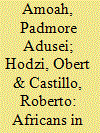

|
|
|
|
|
| Summary/Abstract |
Relations between China and African nations have intensified following the ratification of several multilateral and bilateral developmental agreements, especially after the third Forum on China-Africa Cooperation (FOCAC) summit in 2006. In the past decade, the relations have transcended to the micro-level, with important implications for households and individuals. Of note are the varying forms of population migration between the two places for reasons ranging from business ventures, education, asylum-seeking and family making and reunification. Using various primary and secondary data sources, the seven articles in this special issue delve into the wellbeing, social identities and different kinds of socio-cultural and economic inequalities of Africans in China and Chinese in Africa. Altogether, the articles affirm that policies and mechanisms to ensure decent living conditions, enhanced sense of belonging and social equity among Africans in China and Chinese in Africa are critical to the future of China-Africa relations.
|
|
|
|
|
|
|
|
|
|
|
|
|
|
|
|
| 2 |
ID:
126340
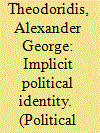

|
|
|
|
|
| Publication |
2013.
|
| Summary/Abstract |
It is easy enough to rattle off numerous categories of social identities long of interest to political behavior scholars-race, sex, state or nation, party, ideology, social class, etc. But, a precise definition and measurement strategy for examining these identities is more elusive. This article discusses the conceptual foundations of a recently developed approach to measuring identity and focuses on its specific application as a new measure of partisanship in the United States.
|
|
|
|
|
|
|
|
|
|
|
|
|
|
|
|
| 3 |
ID:
119477
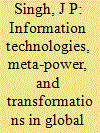

|
|
|
|
|
| Publication |
2013.
|
| Summary/Abstract |
The transformational impact of information technologies changes the dominant meanings of the identity and interests of global actors. These transformations cannot be ascertained through technology's impact upon the capabilities of actors as understood in traditional accounts of power. The concept of meta-power explains the new meanings, which come about in global politics from an increasing number of perspectives and interactions facilitated through information exchanges and learning. Especially when information technologies diffuse or decentralize relations across global actors, we would expect that increased interactions among them would allow new meaning formation to increase. Individual and social identities are no longer singular or linearly consistent through time, and global politics reveal multiple meanings for the issues and actors in question. Illustrative examples are provided for individual-level identity formation and for the implications for global politics in networked environments.
|
|
|
|
|
|
|
|
|
|
|
|
|
|
|
|
| 4 |
ID:
129472
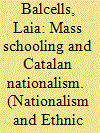

|
|
|
|
|
| Publication |
2013.
|
| Summary/Abstract |
In 1659, the kingdoms of France and Spain signed the Treaty of Pyrenees, a peace treaty by which a piece of the Spanish territory became part of France. Since then, Catalan identity has persisted on both sides of the border. However, while this identity is today politically and socially relevant in Spain, it is not in France. This article argues that this variation can be explained by the characteristics of the historical process of the spread of mass literacy in each of these countries. Catalan national identity is not salient
in French Catalonia because the first generation of mass literates became so under French rule. In contrast, the nonexistence of a scholastic revolution in Spain prior to the beginning of the 20th century allowed for the successful sowing of a Catalan national identity during the first decades of that century. The fact that mass literacy took place in Spanish Catalonia during a period of Catalan nationalist upheaval led to the endurance of this identity.
|
|
|
|
|
|
|
|
|
|
|
|
|
|
|
|
| 5 |
ID:
000649
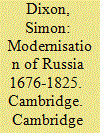

|
|
|
|
|
| Publication |
Cambridge, Cambridge University Press, 1999.
|
| Description |
xvii, 267p.Hbk
|
| Series |
New Approaches to European History
|
| Standard Number |
0521371007
|
|
|
|
|
|
|
|
|
|
|
|
Copies: C:1/I:0,R:0,Q:0
Circulation
| Accession# | Call# | Current Location | Status | Policy | Location |
| 042035 | 947/DIX 042035 | Main | On Shelf | General | |
|
|
|
|
| 6 |
ID:
129970
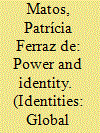

|
|
|
|
|
| Publication |
2014.
|
| Summary/Abstract |
This article reflects on the inclusion of human beings in the colonial representations of the great exhibitions that Portugal organised or took part in during the first half of the twentieth century. It analyses the role played by the natives (from the Portuguese colonies), as well as the way they were represented and treated, based on various documents and interviews and on the study of the exhibition creation process. These exhibitions revealed some underlying tensions. On the one hand, they provided evidence of the differences between the 'civilised' and the 'uncivilised', of the diversity of 'races' and of their places in a hierarchy of civilisation. On the other, they extolled the way colonised peoples adopted Portuguese models. The ways those human beings have asserted their existence, under the power of the exhibition's organisers, provides a means to understand how they forged and assumed their identities in a context of rules.
|
|
|
|
|
|
|
|
|
|
|
|
|
|
|
|
| 7 |
ID:
132269
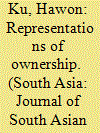

|
|
|
|
|
| Publication |
2014.
|
| Summary/Abstract |
This article explains the changes found in patas (cloth paintings) depicting Shatrunjaya, which were produced for Shvetambara Murtipujak Jains during the nineteenth century in Gujarat. These patas differed from earlier tirtha patas in that they were much larger and depicted Shatrunjaya as the central subject matter. They were also meticulous in depicting the topographical and architectural features of the site, and included Palitana, the adjacent town ruled by the Hindu Thakur. The emergence of the site as a centre for Jain pilgrimage, as well as changes in Jain perceptions of the site, led to these transformations
|
|
|
|
|
|
|
|
|
|
|
|
|
|
|
|
|
|
|
|
|